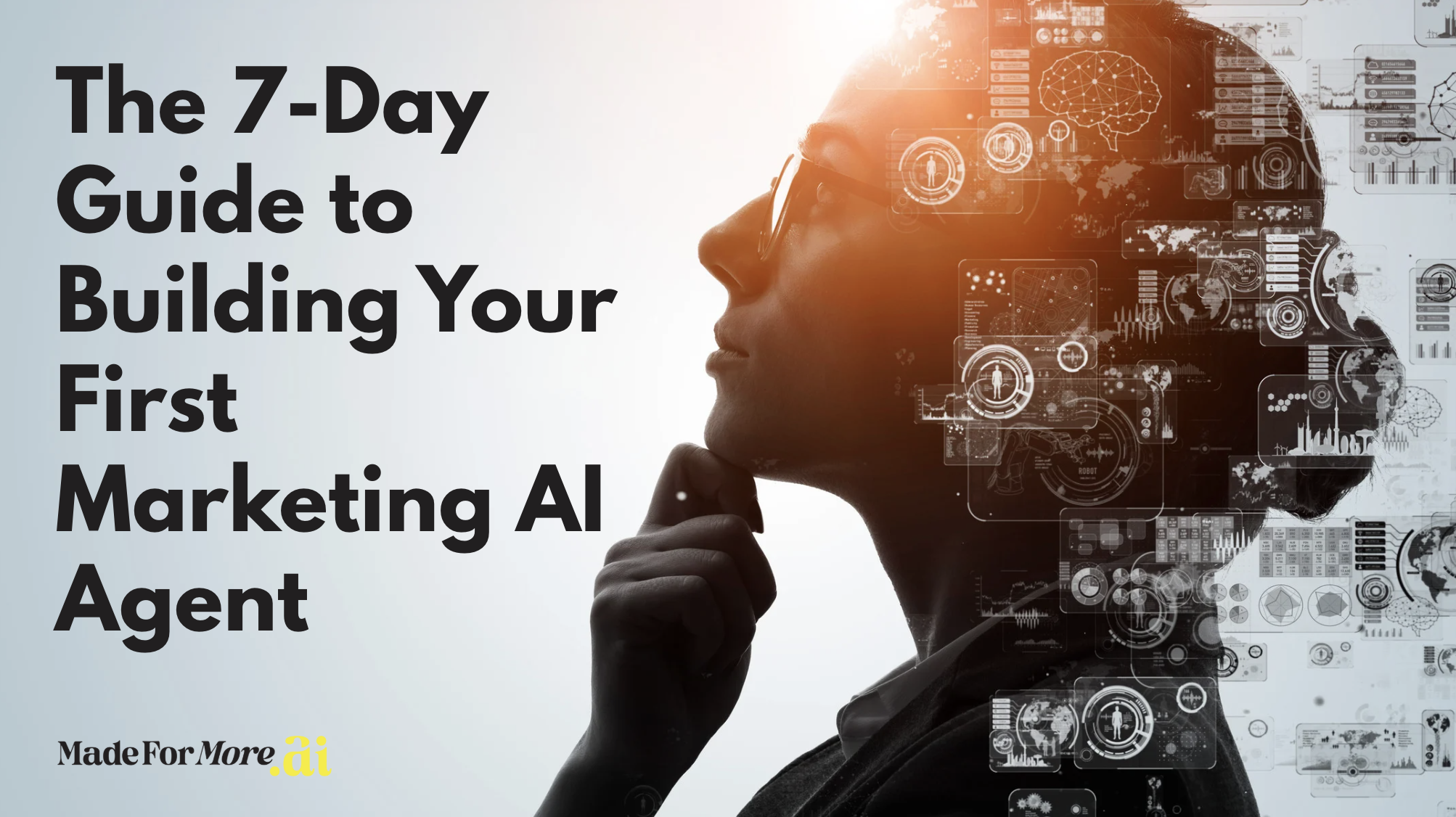

No-Fluff AI & Automation Tips
By our Founder Carly Meyers

The 7-Day Guide to Building Your First Marketing AI Agent
Your marketing automation is about to get seriously smarter..
If you've mastered scheduling tools and automated campaigns, you're just scratching the surface. The next frontier isn't about more automation but smarter automation.
Let's be honest. Most marketing tech stacks are sophisticated but fundamentally passive. They follow rules but can't adapt without your constant supervision.
That's where agentic AI changes everything.
With 15% of daily work decisions expected to be made autonomously by AI agents by 2028, the shift is already happening. The question isn't if you'll implement AI agents in your marketing, but when.
This guide will walk you through building your first marketing AI agent in just seven days. No computer science degree required.
Day 1: Define Your Agent's Purpose
Start small but specific. Your first AI agent should solve one clear marketing problem.
Ask yourself: Which repetitive marketing task consumes too much time? Which decision-making process could benefit from data-driven automation?
Common first agent projects include:
• Content personalisation for different audience segments
• Social media response management
• Campaign performance analysis and optimization
• Lead scoring and qualification
The narrower your focus, the better your results. A targeted agent that excels at one task is more valuable than a mediocre jack-of-all-trades.
Day 2: Map Your Data Landscape
AI agents need data to function. Today, identify all relevant data sources your agent will need access to.
Create a simple table with three columns:
• Data source (CRM, analytics platform, email marketing tool)
• Specific data points needed (customer behaviors, campaign metrics)
• Access method (API, direct integration, manual export)
Don't worry about technical integration yet. Focus on mapping what exists and what's missing.
Remember that data quality matters more than quantity. Clean, structured data will make your agent smarter faster.
Day 3: Select Your Agent Building Platform
Now choose the technology foundation for your agent. Options range from code-free to developer-focused:
No-code options: Platforms like Zapier with AI capabilities, AI-enhanced marketing automation tools
Low-code options: Microsoft Power Automate, Make (formerly Integromat), N8N
Developer platforms: LangChain, AutoGPT frameworks
For your first agent, prioritise platforms that integrate with your existing marketing stack. The best technology is the one you'll actually use.
Be practical. 60% of DIY AI initiatives fail to scale past pilot stages due to unclear ROI. Start simple and build from there.
Day 4: Design Your Agent's Decision Logic
Today's task is creating the rulebook your agent will follow.
Start by mapping the decision tree for your chosen marketing task. If X happens, then do Y.
For example, a social media response agent might follow logic like:
• If comment contains product question → Check knowledge base → Reply with answer
• If comment contains negative sentiment → Flag for human review
• If comment is positive → Like comment and send thank you template
The key is balancing automation with appropriate human oversight. Your agent should handle routine decisions while escalating complex situations to your team.
Day 5: Build Your Minimum Viable Agent
Time to bring your agent to life. Using your chosen platform, create the simplest version that can perform your defined task.
Focus on connecting just one data source and implementing the core decision logic. Ignore bells and whistles.
Test with real marketing scenarios but in a controlled environment. Run parallel to your existing processes before replacing anything.
The goal isn't perfection but a working prototype you can improve through iteration.
Day 6: Train and Test Your Agent
Now feed your agent with historical marketing data and scenarios.
Create a testing protocol with three categories:
• Common scenarios (80% of expected use cases)
• Edge cases (unusual but possible situations)
• Failure scenarios (when should the agent ask for help)
Document everything. Each test reveals opportunities for improvement.
Remember that AI agents learn through exposure to diverse situations. The more varied your testing, the more robust your agent becomes.
Day 7: Deploy and Monitor
Today you'll release your agent into the wild with appropriate guardrails.
Set up monitoring dashboards tracking:
• Accuracy (correct decisions vs. total decisions)
• Efficiency (time saved vs. manual process)
• Escalations (how often humans need to intervene)
• Business impact (conversion improvements, engagement metrics)
The real work begins after deployment. Successful AI agents evolve based on real-world performance.
Organisations implementing AI agents have seen over 46% increase in revenue and 15% reduction in compliance costs. Your results will depend on thoughtful implementation and continuous refinement.
Beyond Week One: Scaling Your AI Marketing Agents
Once your first agent proves valuable, expand methodically:
• Connect additional data sources to enhance decision-making
• Gradually increase the agent's autonomy in proven areas
• Create specialised agents for different marketing functions
• Build agent-to-agent workflows where output from one feeds another
The most powerful marketing stacks feature multiple specialised agents working together rather than one do-everything solution.
Common Challenges and Solutions
Data silos: Use middleware integrations to connect disparate systems
Team resistance: Position agents as assistants that handle tedious work, not replacements
Performance plateaus: Regularly update training data with new marketing scenarios
Compliance concerns: Build approval workflows for regulated content or sensitive decisions
The biggest mistake marketers make is abandoning agents after initial setup. AI marketing agents require ongoing attention to reach their potential.
Getting Started Today
The gap between companies embracing agentic AI and those watching from the sidelines grows wider every month.
While 89% of CIOs consider agent-based AI a strategic priority, most marketing teams still hesitate at the starting line.
Your competitive advantage lies in starting now, learning through implementation, and building institutional knowledge before your competitors.
The best marketing AI agent isn't the most sophisticated one. It's the one that's actually working for you today.
What repetitive marketing task will you automate first?
_______________
Ready to Stop Chasing Leads and Start Attracting Them?
Building your own AI agent is brilliant for getting started, but what if you could skip the learning curve and have a complete system built for you?
Our AI Growth Engine creates a fully automated lead generation machine AND makes your business discoverable by ChatGPT and other AI tools — all done for you in 60 days.
No more manual outreach. No more feast-or-famine months. Just high-quality leads flowing in while you focus on what you do best.
Book a strategy call to learn about the AI Growth Engine →
Already managing your own marketing but tired of juggling multiple platforms? Check out Made For More AI — the all-in-one sales and marketing CRM that actually works the way your brain does.
